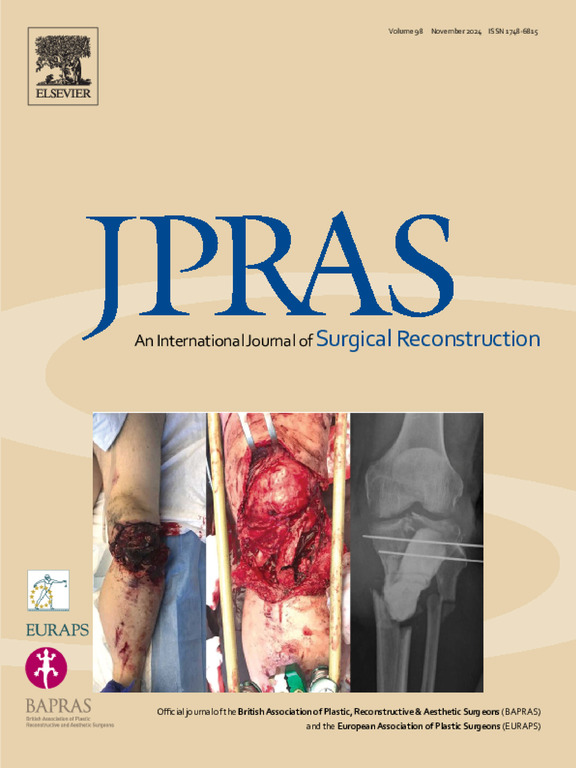整容手术的包容性-见解,建议和教育(INSPIRE):一个针对整容手术中代表性不足的学生的试点身份协调指导计划
IF 2.4
3区 医学
Q2 SURGERY
Journal of Plastic Reconstructive and Aesthetic Surgery
Pub Date : 2025-08-14
DOI:10.1016/j.bjps.2025.08.004
引用次数: 0
摘要
导师制是外科培训不可或缺的一部分,但获得导师制的机会仍然不公平。少数民族(EM)学生,来自低收入家庭的学生,以及第一代医科学生面临着持续的障碍,阻碍了他们进入有竞争力的专业,如整形外科(PS)。为了解决这个问题,我们试点了INSPIRE,这是一个针对英国本科生的首个身份一致性指导项目。目标被定义为在12个月内在三个领域实现80%的改善:研究参与、外科培训准备和职业兴趣。作为一项质量改进倡议,INSPIRE将结构化的面对面教学与纵向、身份一致的研究指导相结合,使用与国家PS优先事项一致的基于审查的项目。通过研究参与、准备和职业兴趣对干预前后的结果进行评估。结果在22名学员中,21名被确定为EM, 15名曾就读于公立学校。所有导师都被确定为来自以下群体之一:少数民族,以前社会经济地位低,或公立学校教育。学员完全遵守了项目要求,100%参加了所有的教学课程,并完成了3次以上的导师会议。在基线时,21人没有出版物或全国演讲,没有人有机会获得PS导师。干预后,18人提交或准备了一篇论文(RD=77%, p<0.001), 59%的人在全国发表过论文(RD=55%, p<0.001)。对学术手术的兴趣增加了42% (p=0.004), PS增加了40% (p=0.004)。结论inspire显著提高了弱势学生的研究参与度,增强了他们对PS职业的兴趣。这些结果突出了身份一致性指导的价值。本文章由计算机程序翻译,如有差异,请以英文原文为准。
Inclusivity in plastic surgery – Insights, Recommendations, & Education (INSPIRE): A pilot identity-concordant mentorship programme for underrepresented students in plastic surgery
Introduction
Mentorship is integral to surgical training, yet access remains inequitable. Ethnic minority (EM) students, those from low-income households, and first-generation medical students face persistent barriers that hinder progression into competitive specialties like Plastic Surgery (PS). To address this, we piloted INSPIRE, a first-in-kind identity-concordant mentorship programme for UK undergraduates.
Aim
The aim was defined as achieving an 80% improvement over 12 months across three domains: research engagement, preparedness for surgical training, and career interest.
Methodology
Delivered as a Quality Improvement initiative, INSPIRE combined structured face-to-face teaching with longitudinal, identity-concordant research mentorship, using review-based projects aligned with national PS priorities. Outcomes were assessed pre- and post-intervention across research engagement, preparedness, and career interest.
Results
Of 22 mentees, 21 identified as EM and 15 had attended a state school. All mentors identified as being from one of the following groups: ethnic minorities, previously of low socio-economic status, or state school educated. Mentees showed full adherence to programme requirements, with 100% attending all teaching sessions and completing ≥3 mentorship meetings. At baseline, 21 had no publications or national presentations, and none had access to a PS mentor. Post-intervention, 18 had submitted or had prepared a publication (RD=77%, p<0.001) and 59% had presented nationally (RD=55%, p<0.001). Interest in academic surgery rose by 42% (p=0.004) and PS by 40% (p=0.004).
Conclusion
INSPIRE significantly improved research engagement and strengthened PS career interest among underrepresented students. These results highlight the value of identity-concordant mentorship.
求助全文
通过发布文献求助,成功后即可免费获取论文全文。
去求助
来源期刊
CiteScore
3.10
自引率
11.10%
发文量
578
审稿时长
3.5 months
期刊介绍:
JPRAS An International Journal of Surgical Reconstruction is one of the world''s leading international journals, covering all the reconstructive and aesthetic aspects of plastic surgery.
The journal presents the latest surgical procedures with audit and outcome studies of new and established techniques in plastic surgery including: cleft lip and palate and other heads and neck surgery, hand surgery, lower limb trauma, burns, skin cancer, breast surgery and aesthetic surgery.

 求助内容:
求助内容: 应助结果提醒方式:
应助结果提醒方式:


